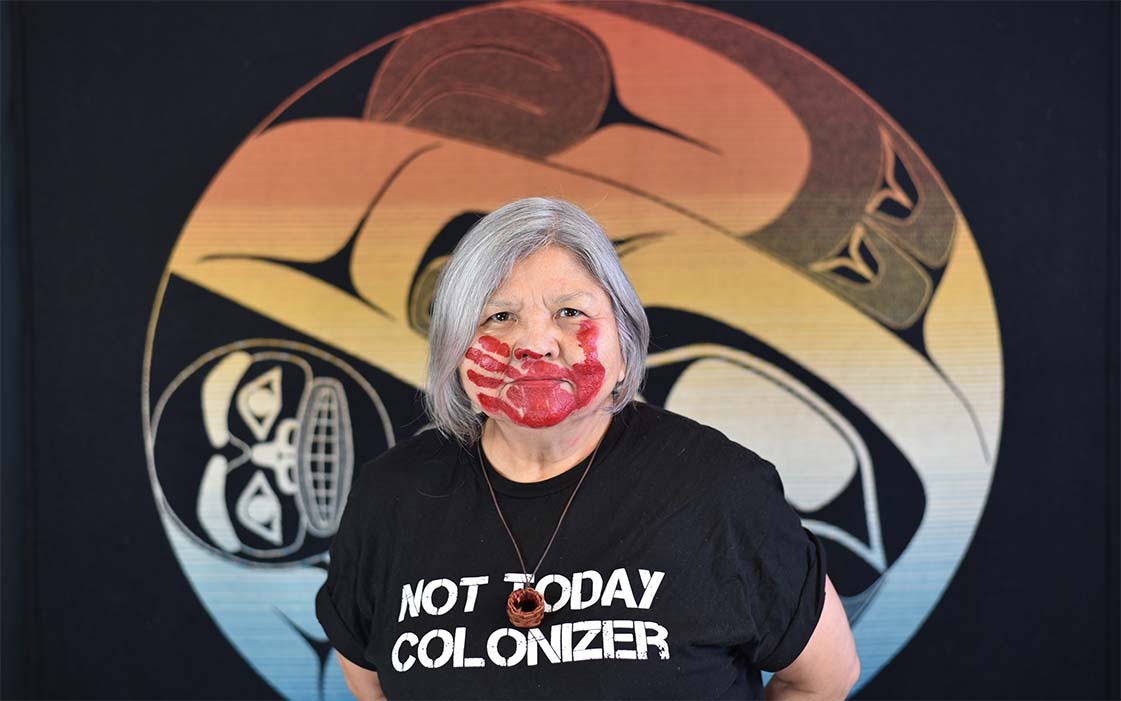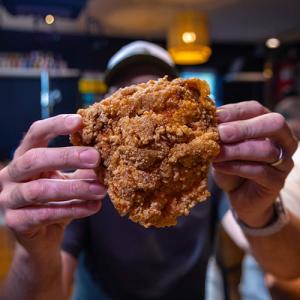
Mona Halcomb: Banking on Her Future
After years and decades of being told she was in the wrong place, Mona Halcomb, ’23, Ed.D. Educational Leadership, is just getting started.
You’ve probably seen a “40 under 40” list. These lists spotlight movers and shakers as well as up-and-coming adults under the age of 40. Ramona “Mona” Halcomb has a different idea. “I want to start a 70-over-70 because I’m 68 and just completed a doctorate,” she said.
Halcomb is part of the inaugural Muckleshoot Cohort, an Indigenous-centered group of students studying educational leadership via a unique partnership between UW Tacoma and the Muckleshoot Indian Tribe. The doctorate she’s set to receive is the conclusion to a journey that started back in 1991 at Shoreline Community College. “I’ve taken one class at a time from then until now,” she said.
Born in Oregon, Halcomb is a citizen of the Confederated Tribes of the Umatilla Indian Reservation. Due to the Indian Relocation Act of 1956, Halcomb, her mother and brothers moved to Los Angeles in the mid-1960s. “When I was there, people didn’t like me because I was too light-skinned and had long, straight hair,” she said. The family eventually moved to the surfing hub of Hawthorne, Calif. “I had trouble there because people thought I was too dark,” she said.
Halcomb traveled back to the Umatilla Indian Reservation during breaks from school. “They didn’t like me because I was an ‘urban Indian,’” she said. “I decided that, since nobody liked me, I would like myself and be comfortable in my own skin.”
Both of Halcomb’s parents were removed from their homes by the U.S. government and forced to attend boarding schools where the prevailing philosophy was ‘Kill the Indian, save the man.’ “The fact that both of my parents were in boarding schools affected how they raised me and affected how I viewed education,” said Halcomb.
Halcomb struggled in school, not because she lacked intelligence. “I had high school counselors who told me that I should join the military or work in the factory because that’s all I would be capable of,” she said.
If there is a point of light in this part of Halcomb’s story, it is this: there has always been one person who saw her potential. “I was a teen mom and my chances of finishing high school weren’t great,” she said. “I had this one counselor who worked with me and adapted my classes so that I could graduate on time.”
After high school Halcomb worked a series of jobs. “I was an insurance biller, processed real estate and construction loans and held jobs in the medical field,” she said. Then, in 1990, she took a position at Shoreline that would change the trajectory of her life.
While at Shoreline, Halcomb met a professor named Ken La Fontaine. “He told me, ‘You’re bright, you should go to school,’” said Halcomb. “That was the first time that somebody talked to me about continuing my education.”
“I feel like education is one of those areas that can both help us understand who we are and understand who the world is in a larger context and understand what we're supposed to do in this world.”
La Fontaine passed away in 2006 from pancreatic cancer. “Before he passed he made me promise that I would finish my degree,” said Halcomb. “He was always encouraging Natives to pursue education and I wanted to honor his legacy.”
The path from there to here has been long and, at times, difficult. “I had one professor say to me in the front of the whole class ‘What are you doing here?’ said Halcomb. “I had to fight back tears.” Still, Halcomb pressed on, in part because the education she received provided perspective. “I started to understand more about my own lived experience,” she said. “I took these little strands of knowledge and wove them together into an understanding of who I am.”
Halcomb finished her associate’s degree then went on to earn a bachelor’s from UW Bothell as well as a master’s. Halcomb spent a lot of time on college campuses at this point in her life. Besides Shoreline, she also worked at Everett Community College, Cascadia College, UW in Seattle and Northwest Indian College.
“I think getting this doctorate won't make me any different than who I really am already, but it'll make other people trust more of who I am and what I know.”
Halcomb moved back to Oregon and became the Director of Education with the Confederated Tribes of the Umatilla Indian Reservation. After a few years she accepted the role as Indian Education Specialist with the Oregon Department of Education. “I enjoyed what I did but I had (still have) a great granddaughter in Washington and I didn’t want her growing up not knowing me,” said Halcomb.
Halcomb returned to Washington and currently works for the Office of Superintendent of Public Instruction. “I work full time and have been going to school full time while still trying to be an involved grandma and great-grandma,” she said. “It’s been a challenge as a tribal person because I feel like I should be there for my family, but I’ve had to miss some things.”
The Muckleshoot cohort started work three years ago. It hasn’t been easy. COVID upended life, but Halcomb found support. “We’ve all faced challenges but we’ve come together as sisters,” she said. “I couldn’t ask for more supportive faculty. I mean, what a breath of fresh air. To go from someone asking me why I was even in college to what I found here is so transformative and life changing.”
Those “40 under 40” lists are banking on the future. Well, so is Halcomb. “There is no return on investment for me in the traditional sense because of my age,” she said. “At the same time, I feel like it’s an investment and it’s been well worth it.”
The investment is in Halcomb, but it’s also in her children, grandchildren and great-grandchildren, all of whom will attend Halcomb’s graduation. “I’m fortunate that my mom is still with us, so there will be five generations at Commencement,” said Halcomb.
Recent news
Main Content
Educated Palate
Main Content
Lawless Honored with Governor’s Student Civic Leadership Award
Main Content
Towards the Functional Characterization of All Human Genes
UW Tacoma in the News
Main Content
Minnesota adoptees respond to fraud reports in South Korean adoption programs
Main Content
What’s next for The Swiss? Upcoming workshop to tackle how to best use iconic site
Main Content
Local Leaders Recognized at UW Tacoma’s Business Leadership Awards
Contact Information
- Phone: 253-692-4430
- Email: uwted@uw.edu
- Education, School of (directory)



